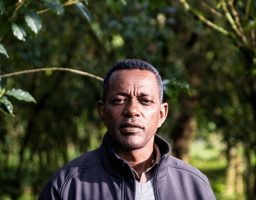Negusse Tadesse’s Tatmara farm is located in the administrative Southern Nations, Nationalities and Peoples’ Region. It sits in the heart of an ancient coffee region, 15 km from Bonga, in the village of Dakiti (Gimbo district). Kaffa is a birthplace of coffee.
The name “Tatmara" is derived from two words in the Kaffa language, “Tato" meaning king and “Mara" meaning forgiveness. And it was here that the successive kings of Kaffa used to travel once a year to pardon prisoners. This custom ended in the 19th century following annexation of the land by Emperor Menelik II.
The Negusse farm extends over 82 hectares, 5 of which are reserved for infrastructures, buildings and drying stations. With the help of his teams, he collects natural and honey forest coffees dried on African beds. The 77 hectares dedicated to coffee, which he has been cultivating for 10 years, are spread throughout a forest rich in endemic species. More than 30 varieties of trees surround the Negusse coffee plants, providing ideal shade for slow cherry ripening. Some trees, such as the qararo, are endangered in Ethiopia, and the agroforestry model developed by Negusse is a way of protecting them. This farm has a remarkable diversity of flora and fauna. Large numbers of monkeys and birds (some have even seen leopards) live among the constant buzz of insects, signs of a rich and healthy wildlife.
The farm’s biodiversity has allowed Negusse to pursue several lines of business, including the sale of spices, for example malagueta, and honey. The different tree species allow staggered flowering, meaning that he can collect three types of honey with very distinct characteristics. His Tatmara coffees, produced using the 74140, 74110, 74112 and Wush Wush varieties, offer a wide range of complex and interesting aromas.
Our teams are helping Negusse to preservethisrich ecological wealth. Our collaborative work has two important and inseparable areas of focus: promotion of the rare local biodiversity and an even higher quality coffee. Our agronomist, Marjorie, has organised several training sessions to improve harvesting and drying techniques. She has also helped Negusse’s teams to introduce the honey process. Fufa, who is our agronomist at the Addis Ababa office, Shambé and Jacques are on hand all year round to continue providing support.




